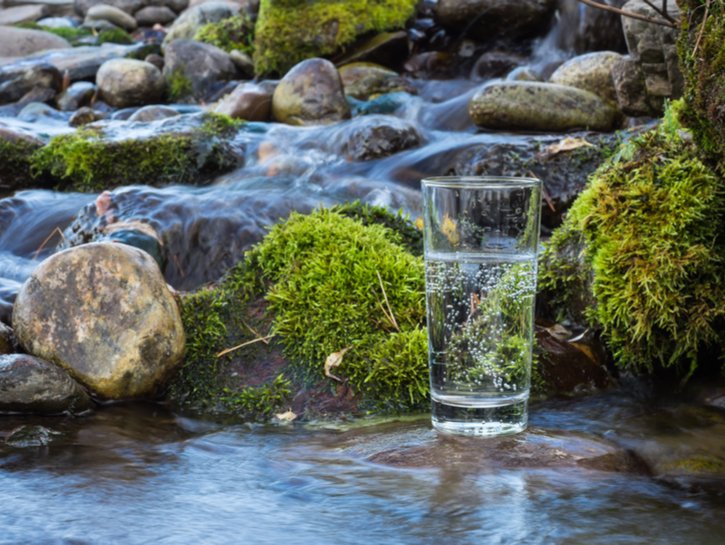Aside from its fizzy deliciousness, the mineral content of sparkling mineral water (shocker, I know) is reason enough to add this simple beverage into your daily diet. It’s as hydrating as flat water with no calories, which is the icing on the cake.
Mineral water contains high amounts of sulfates, magnesium, calcium, bicarbonate and other minerals — all things that play an important role in your health. It is important to note that some mineral water brands have more minerals than others, so check that out before you buy.

Shark_749/Shutterstock
Mineral Water’s Supply of Minerals
Sulfates
There is a reason to believe that sulfates are more important to focus on than other minerals because they are harder to efficiently put into the body for use. Eating foods that have a high sulfur content, such as eggs and broccoli, does not give your body enough of the mineral. Also, because of the impact humans have had on the earth’s soil through agriculture, the ground has less sulfur. This means less sulfur is absorbed into the plants we eat in the first place, which is why getting it from another source, like mineral water, is necessary.
The health benefits of sulfates include muscle, joint and nervous system health and detox. Sulfates also reduce acidity in the body because they produce digestive enzymes that lessen issues such as constipation and bloating.
Sulfur deficiency can potentially lead to some severe health problems, including obesity, Alzheimer’s, chronic fatigue and heart disease.
Calcium
Many mineral water options contain up to 348 milligrams of calcium per liter, which is around 44 percent of the amount of the daily calcium needed. Calcium is well-known for increasing bone health and strength, but it also promotes muscle and heart function, nerve transmission, hormone secretion and cell signaling.
Studies have shown that getting calcium from mineral water is comparable, or maybe even better, than from dairy because of calcium’s high rates of absorption.

yanik88/Shutterstock
Magnesium
Mineral water can also include as much as 108 milligrams of magnesium for every liter, or about 29 percent of what’s needed daily. Magnesium is essential in the body’s energy production and helps with many biological functions. These include muscle and nerve function, blood sugar regulation, blood pressure regulation and protein synthesis. Because many people do not get enough magnesium, mineral water provides an excellent opportunity to get the body’s necessary magnesium intake.
Bicarbonates
Mineral water contains varying levels of electrolytes called bicarbonates, some with thousands of milligrams per liter and some with hundreds (both are good amounts to have). For instance, San Pellegrino and Perrier have about 219 milligrams per liter and 390 milligrams per liter, respectively. Research has shown that bicarbonates can help to improve type 2 diabetes as well as decrease fatigue in physically active people.
Sodium
We usually assume sodium is harmful, but sodium consumed in smaller quantities is necessary for our health. Like bicarbonates, sodium is also an electrolyte, and it is an essential mineral in staying healthy. It regulates fluid levels, improves brain function, gets rid of excess carbon dioxide in the body and provides relief from muscle cramps.

Shebeko/Shutterstock
Mineral Water And Hydration
For whatever reason, a significant portion of the population does not stay as hydrated as they should. Because being well-hydrated is essential for health, sparkling mineral water might be the answer to this problem. Sufficient hydration assists the body in its natural cooling mechanisms that keeps the eyes, nose and mouth moist. Hydration also helps with joint and muscle function, contributes to cardiovascular health and helps the body clean itself of toxins.
Mineral Water And Electrolytes
Sweating causes people to lose not only water but many minerals (some of which are electrolytes) that are dissolved in that water. To keep the body working both efficiently and energetically, the electrolytes have to be replaced. Drinking mineral water can help get the electrolytes that escaped through our sweat back into the body because many mineral waters contain a fair amount of them.
Maintaining A Healthy Weight With Mineral Water
It’s easy to grab a sugary beverage when your thirst kicks in, but those drinks are packed with useless calories that lead to unnecessary weight gain. Including more water in your diet has known links to weight loss. Drinking sparkling mineral water will often satisfy the craving for a fancier drink than water, and without all those calories. Plus, it can regulate body fat. Mineral water is a fat-free supplement that also provides plenty of fat metabolizing minerals. It also helps to break down fat, a crucial step in burning extra layers of fat in the body.

All kind of people/Shutterstock
Reducing Cardiovascular Diseases With Mineral Water
Because mineral water can metabolize fat from the human body, the body’s production of bad cholesterol is curbed. When bad cholesterol, or LDL, is ingested, it is deposited near and inside of blood capillaries, which increases blood pressure and the risk of a heart attack. Mineral water inhibits the growth and accumulation of LDL in the capillaries, making sure the pathways are open to minimize the risk of cardiovascular disease.
Maintaining Healthy Skin With Mineral Water
The high level of silica contained in mineral water is great for your skin. It keeps the skin moist, which slows down the process of wrinkle formation. Additionally, aside from just ingesting it, using mineral water to clean your face will keep your skin brighter and looking healthy.
Easing Arthritis With Mineral Water
Some research indicates that some mineral water, discovered through the Scottish brand ‘Deeside’, can reduce inflammation in joints and pain associated with rheumatoid arthritis when consumed daily, according to the BBC. In the U.S. alone, 1.5 million people are affected by arthritis, so including mineral water in their diets could provide significant pain relief.
